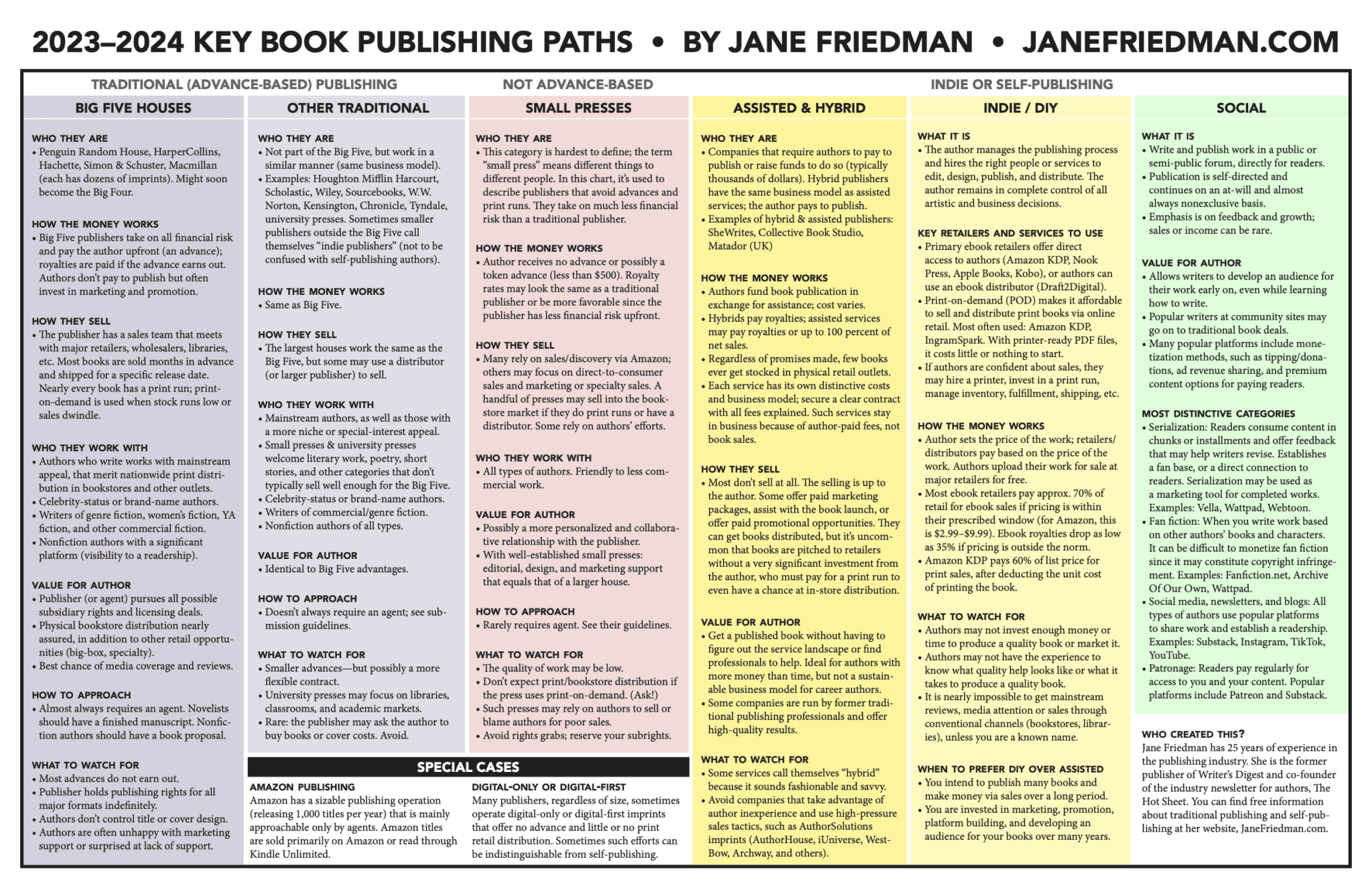Are you an aspiring author looking to publish your own book? With the rise of self-publishing, there are now numerous companies that can help you turn your manuscript into a published book. But with so many options available, how do you find the best self-publishing company for your book? In this ultimate guide, we will walk you through the process of finding the perfect self-publishing company that fits your specific needs and goals. Whether you're looking for a company that offers a wide range of services or one that specializes in a particular genre, we've got you covered.
Our comprehensive guide covers everything from researching different self-publishing companies to understanding their pricing models and evaluating their track record. We'll also share insider tips on how to navigate the self-publishing industry, so you can make an informed decision about which company is the right fit for you. So if you're ready to take the next step in your publishing journey, let's dive in and find the best self-publishing company for your book.
Benefits of self-publishing
Self-publishing has revolutionized the publishing industry, providing aspiring authors with the opportunity to turn their dreams of becoming a published author into a reality. There are several key benefits to self-publishing that make it an attractive option for many authors.
First and foremost, self-publishing offers creative control. Unlike traditional publishing, where authors often have to compromise on their vision, self-publishing allows authors to retain full control over their work. This means that you have the final say on everything from the cover design to the content of your book.
Another major advantage of self-publishing is the speed at which you can get your book out into the world. Traditional publishing can be a lengthy process, involving finding an agent, securing a publishing deal, and waiting for your book to be released. With self-publishing, you can take matters into your own hands and publish your book on your own timeline.
Finally, self-publishing offers higher royalty rates. Traditional publishing typically involves signing a contract with a publishing house, which often results in lower royalty rates for the author. In contrast, self-publishing allows authors to keep a larger percentage of the profits from book sales.
Overall, self-publishing offers authors more creative control, faster publication timelines, and higher royalty rates, making it an appealing option for those looking to publish their own book.
Traditional publishing vs. self-publishing
Before diving into the process of finding the best self-publishing company, it's essential to understand the key differences between traditional publishing and self-publishing.
Traditional publishing involves submitting your manuscript to literary agents or publishing houses in the hopes of securing a publishing deal. If your book is accepted, the publisher will handle the editing, design, printing, distribution, and (in rare cases) marketing of your book. While this route can offer authors greater visibility and access to professional editing and design services, it often comes at the cost of creative control and significantly lower royalty rates.
Self-publishing, on the other hand, puts the power back in the hands of the author. With self-publishing, authors are responsible for every aspect of the publishing process, from editing and design to distribution and marketing. This option allows for greater creative control, faster publication timelines, and higher royalty rates.
Additional options like hybrid, assisted, and digital-first publishing offer varied control levels, investment requirements, and distribution methods, catering to diverse author needs and preferences.
For a full and comprehensive breakdown of all publishing options, check out Jane Friedman's frequently updated and well-known The Key Book Publishing Paths PDF, as seen here:

All publishing paths have their pros and cons, and the choice ultimately depends on your goals, preferences, and resources. If you value creative control and want to take charge of your publishing journey, self-publishing may be the right choice for you.
Factors to consider when choosing a self-publishing company
Now that you've decided to pursue self-publishing, it's time to find the best self-publishing company for your book. With so many options available, it can be overwhelming to narrow down your choices. Here are some essential factors to consider when selecting a self-publishing company:
- Experience and track record: Look for a self-publishing company with a proven track record of success. Research their history, check out their portfolio of published books, and see if they have any success stories or testimonials from authors they have worked with. It pays to do your research and search for both positive and negative reviews.
- Services offered: Consider the range of services offered by the self-publishing company. Do they provide editing, design, formatting, and marketing support? It's crucial to find a company that offers the services you need to ensure your book is polished and reaches its target audience. It's equally as important to find a company that doesn't offer more than you need, so you're not paying for services you don't require.
- Genre specialization: Some self-publishing companies specialize in specific genres, such as romance, mystery, or non-fiction. If your book falls into a particular genre, it may be beneficial to choose a company that has experience and expertise in that genre. This can be particularly important for authors of illustrated books like children's books, graphic novels, and comic books, since these books require a different set of skills than your typical novel.
- Distribution channels: Check which distribution channels the self-publishing company works with or supports. Ensure that your book will be available on popular online platforms such as Amazon, Barnes & Noble, and Apple Books. Also, consider whether they offer or support third-party print-on-demand services if you plan to have physical copies of your book.
- Cost and pricing structure: Self-publishing companies have different pricing models, ranging from upfront fees to revenue-sharing agreements. It's important to determine your budget and understand the pricing structure of each company you are considering. Consider the value you will receive for the cost and ensure it aligns with your financial goals.
By taking these factors into account, you can narrow down your options and find a self-publishing company that aligns with your needs and goals.
Researching self-publishing companies
Once you have a list of potential self-publishing companies, it's time to dive deeper into your research. Here are some steps to help you gather the necessary information:
- Website evaluation: Start by visiting the websites of the self-publishing companies on your list. Evaluate the overall professionalism and user-friendliness of their websites. Look for clear information about their services, pricing, and contact details.
- Author testimonials and success stories: Look for testimonials and success stories from authors who have worked with the self-publishing companies you are considering. Pay attention to the quality of the books they have published and the authors' overall satisfaction with the company's services.
- Online presence and reputation: Research the self-publishing companies on social media platforms and online forums. Read reviews and comments from authors who have worked with them. Pay attention to any red flags or recurring complaints.
- Reach out to authors: If possible, reach out to authors who have published books with the self-publishing companies you are interested in. Ask them about their experience, the quality of the services provided, and any challenges they faced during the process.
By conducting thorough research, you can gather valuable insights and make an informed decision about which self-publishing company is the best fit for your book.
Evaluating the reputation and track record of self-publishing companies
When choosing a self-publishing company, it's crucial to evaluate their reputation and track record. Here are some key factors to consider:
- Publishing history: Look into the publishing history of the self-publishing company. How many books have they published? Are these books well-received and well-regarded in the industry? A company with a robust publishing history indicates their commitment to quality and professionalism. But don't rule out newcomers to the publishing space -- they can provide opportunities and innovations that more established companies simply cannot provide.
- Awards and recognition: Check if the self-publishing company has received any awards or recognition for their work. This can be a good indicator of their expertise and the quality of the books they have published.
- Author testimonials and reviews: Read testimonials and reviews from authors who have worked with the self-publishing company. Look for positive feedback regarding the company's professionalism, communication, and the overall publishing experience.
- Industry partnerships: See if the self-publishing company has any partnerships or collaborations with industry professionals, such as editors, designers, or marketers. This can indicate their commitment to providing high-quality services.
By evaluating the reputation and track record of self-publishing companies, you can gain confidence in your choice and ensure that your book is in capable hands.
Understanding the services offered by self-publishing companies
When choosing a self-publishing company, it's crucial to understand the services they offer. Here are some common services provided by self-publishing companies:
- Editing and proofreading: Professional editing and proofreading services are essential to ensure your book is free of errors and maintains a high standard of quality.
- Design and formatting: Eye-catching book design and interior formatting are crucial for attracting readers and providing a professional reading experience, and can save you from making costly mistakes along the way.
- ISBN assignment: An ISBN (International Standard Book Number) is a unique identifier for your book. Some self-publishing companies provide ISBN assignment as part of their services.
- Distribution: Look for self-publishing companies that offer distribution services or support distribution to popular online platforms, such as Amazon, Barnes & Noble, and Apple Books. Consider whether they also provide print-on-demand options for physical copies of your book.
- Marketing and promotion: Self-publishing companies may offer marketing and promotion services to help you reach your target audience. These services can include book launch campaigns, social media promotion, and advertising.
- Author support and guidance: Find out if the self-publishing company provides ongoing support and guidance throughout the publishing process. This can be invaluable, especially if you're a first-time author.
By understanding the services offered by self-publishing companies, you can choose a company that provides the necessary support to bring your book to life.
Comparing pricing and royalty structures
Pricing is an essential consideration when choosing a self-publishing company. Here are some aspects to consider when comparing pricing and royalty structures:
- Upfront fees vs. revenue-sharing: Self-publishing companies may charge upfront fees for their services or work on a revenue-sharing model, where they take a percentage of your book's sales. Consider your budget and financial goals to determine which pricing structure works best for you.
- Royalty rates: Compare the royalty rates offered by different self-publishing companies. Consider both the ebook and print book royalty rates, as well as any additional fees or deductions.
- Value for cost: Remember to consider the value you will receive for the cost. Look beyond the pricing and assess the quality of the services provided, the company's track record, and the overall reputation of the company.
- Long-term costs: Consider any ongoing costs or fees associated with the self-publishing company. Some companies may charge for additional services or maintenance fees for hosting your book on their platform.
By comparing pricing and royalty structures, you can find a self-publishing company that aligns with your financial goals and offers fair compensation for your work.
Reading reviews and testimonials
Reviews and testimonials from authors who have worked with self-publishing companies can provide valuable insights into the quality of their services and overall experience. When reading reviews and testimonials, consider the following:
- Overall satisfaction: Look for reviews that express overall satisfaction with the self-publishing company. Positive feedback regarding the quality of services, professionalism, and communication is a good sign.
- Specific services: Pay attention to reviews that mention specific services provided by the company. Look for positive feedback regarding editing, design, distribution, and marketing support.
- Challenges and drawbacks: Take note of any challenges or drawbacks mentioned in the reviews. Look for recurring themes or issues that may be a cause for concern.
- Credibility and authenticity: Consider the credibility and authenticity of the reviews and testimonials. Look for reviews from reputable sources or trustworthy authors.
By reading reviews and testimonials, you can gain insights into the experiences of other authors and make an informed decision about which self-publishing company to choose.
Making your decision and moving forward with a self-publishing company
After conducting thorough research and evaluating your options, it's time to make your decision and move forward with a self-publishing company. Here are some final steps to take:
- Contact the company: Reach out to the self-publishing company you have chosen, or thoroughly explore their website. Inquire about their services, pricing, and any specific questions you may have.
- Review the contract: Carefully review the contract or agreement provided by the self-publishing company. Ensure you understand the terms and conditions, including any rights you retain as the author.
- Prepare your manuscript: Polish your manuscript and make any necessary revisions before submitting it to the self-publishing company, even if they provide professional editing services, as authors are often limited to the number of revisions and submissions included. Consider hiring a professional editor or proofreader to ensure your book is in top shape.
- Follow the company's guidelines: Each self-publishing company may have specific submission guidelines. Follow these guidelines carefully to ensure a smooth publishing process.
By following these steps, you can confidently move forward with a self-publishing company and embark on your journey to becoming a published author.
Finding the best self-publishing company for your book requires thorough research, evaluation of services, pricing comparison, and reading reviews and testimonials. By considering the factors outlined in this guide and taking the necessary steps, you can find a self-publishing company that aligns with your specific needs and goals.
Remember, self-publishing puts you in control of your publishing journey, allowing you to bring your vision to life and share your story with the world. Good luck on your publishing journey!
Discover Made Live: Your Self-Publishing Companion
Embark on your self-publishing journey with Made Live, a comprehensive software platform designed to support children's book authors at every step. From drafting your manuscript to designing, publishing, and marketing, Made Live offers an accessible, user-friendly suite of tools to bring your book to life. Dive into a world where publishing your work is not just a dream but a tangible, achievable goal.
Ready to transform your publishing experience? Learn more about how Made Live can simplify your path to publication and help you reach readers worldwide. Start your free trial today and take the first step towards publishing success.
Learn More and Start Your Free Trial or contact us if you have questions.




